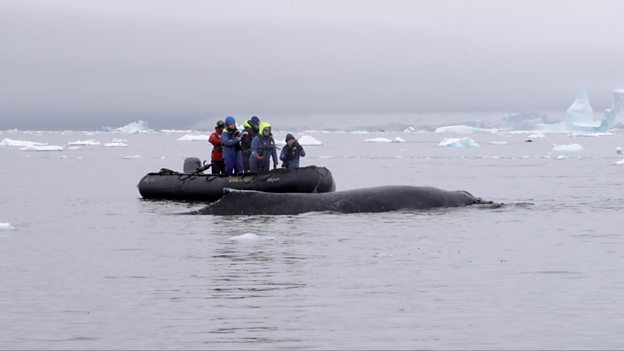英语大破解
What studying whales in Antarctica can tell us about climate change 科学家通过监测南极鲸鱼研究气候变化

本集内容
What studying whales in Antarctica can tell us about climate change 科学家通过监测南极鲸鱼研究气候变化
文字稿
These are humpback whales in Antarctica.
画面中看到的是南极座头鲸。
Scientists say climate change could put their population at risk, so they are studying the whales to monitor changes.
科学家们说,气候变化可能会危及座头鲸的数量,因此他们通过对鲸鱼展开研究来监测变化。
The team uses a crossbow to take biopsies of whale tissue.
这个研究小组用弩取鲸鱼组织进行活检。
These biopsies provide information about health and pregnancy which helps them keep track of the whale population.
这些活检结果可以提供有关鲸鱼健康和怀孕方面的信息,帮助科学家们监测鲸鱼数量。
Dr Natalia Botero-Acosta, University of California Santa Cruz
"In years that we have low sea ice, then the following year, you have lower pregnancy rates, and that's as good as it gets in getting to know the environment and getting to know the effects of all these conservation threats on the animals."
娜塔莉娅·博特罗-阿科斯塔博士 美国加利福尼亚大学圣克鲁斯分校
“在海冰较少的年份,转年鲸鱼的怀孕率就会降低,能收集到这些信息已经非常好了,因为我们能以此了解生态环境的变化以及鲸鱼面临的生存威胁。”
The whales eat krill, which feed on microscopic plants in sea ice.
鲸鱼以磷虾为食,而磷虾以海冰中的微小植物为食。
Drone images used to estimate the whales' size indicate that they are losing weight as less sea ice means fewer krill to eat.
用于估算鲸鱼体型大小的无人机影像显示,这些鲸鱼的体重正在减轻,这是因为海冰减少了,可供鲸鱼食用的磷虾数量也随之减少。
The gold you see in the water is whale poo.
你看到的这些漂浮在水中的金色物体是鲸鱼粪便。
It tells the team about the whales' diet and toxin loads.
研究小组通过分析鲸鱼粪便可以得知它们的饮食结构和体内的毒素含量。
Dr Sarah Kienle, Baylor University, Texas
"Liquid gold!"
莎拉·基恩勒博士 美国德克萨斯州贝勒大学
“看着就像液体黄金!”
BBC Reporter
"Is that what I think it is?"
BBC通讯员
“这和我想的是同一种东西吗?”
Dr Sarah Kienle, Baylor University, Texas
"It's exactly what you think it is, and it smells exactly like you think it would."
莎拉·基恩勒博士 美国德克萨斯州贝勒大学
“和你想的是同一种东西,闻上去也和你想的一样。”
BBC Reporter
"It's whale poo."
BBC通讯员
“这是鲸鱼粪便。”
Dr Sarah Kienle, Baylor University, Texas
"Whale poo, yeah."
莎拉·基恩勒博士 美国德克萨斯州贝勒大学
“没错,就是鲸鱼粪便。”
By using technology to check on these whales, the team hopes to better protect the ocean for all wildlife.
通过利用科技手段来监测这些鲸鱼的健康状况,这个研究小组希望能更好地保护海洋,让所有野生动物的栖息地更 “宜居”。